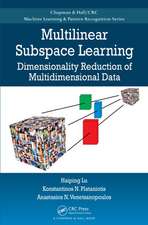WLAN Positioning Systems: Principles and Applications in Location-Based Services
Autor Azadeh Kushki, Konstantinos N. Plataniotis, Anastasios N. Venetsanopoulosen Limba Engleză Hardback – 25 ian 2012
Preț: 614.34 lei
Preț vechi: 690.28 lei
-11% Nou
Puncte Express: 922
Preț estimativ în valută:
117.57€ • 122.29$ • 97.06£
117.57€ • 122.29$ • 97.06£
Carte tipărită la comandă
Livrare economică 14-28 aprilie
Preluare comenzi: 021 569.72.76
Specificații
ISBN-13: 9780521191852
ISBN-10: 0521191858
Pagini: 160
Ilustrații: 61 b/w illus. 11 tables
Dimensiuni: 180 x 253 x 12 mm
Greutate: 0.48 kg
Ediția:New.
Editura: Cambridge University Press
Colecția Cambridge University Press
Locul publicării:Cambridge, United Kingdom
ISBN-10: 0521191858
Pagini: 160
Ilustrații: 61 b/w illus. 11 tables
Dimensiuni: 180 x 253 x 12 mm
Greutate: 0.48 kg
Ediția:New.
Editura: Cambridge University Press
Colecția Cambridge University Press
Locul publicării:Cambridge, United Kingdom
Cuprins
Part I. History and Applications: 1. Positioning through the ages; 2. Location-based services; 3. Positioning techniques; 4. Positioning systems; Part II. Signal Processing Theory: 5. Positioning in wireless local area networks; 6. Memoryless positioning; 7. Model-based positioning; 8. Sensor selection; 9. System design considerations; 10. The road ahead.
Notă biografică
Descriere
Describes the relevant detection and estimation theory, sets out key design challenges and examines practical design trade-offs and experimental results.




















